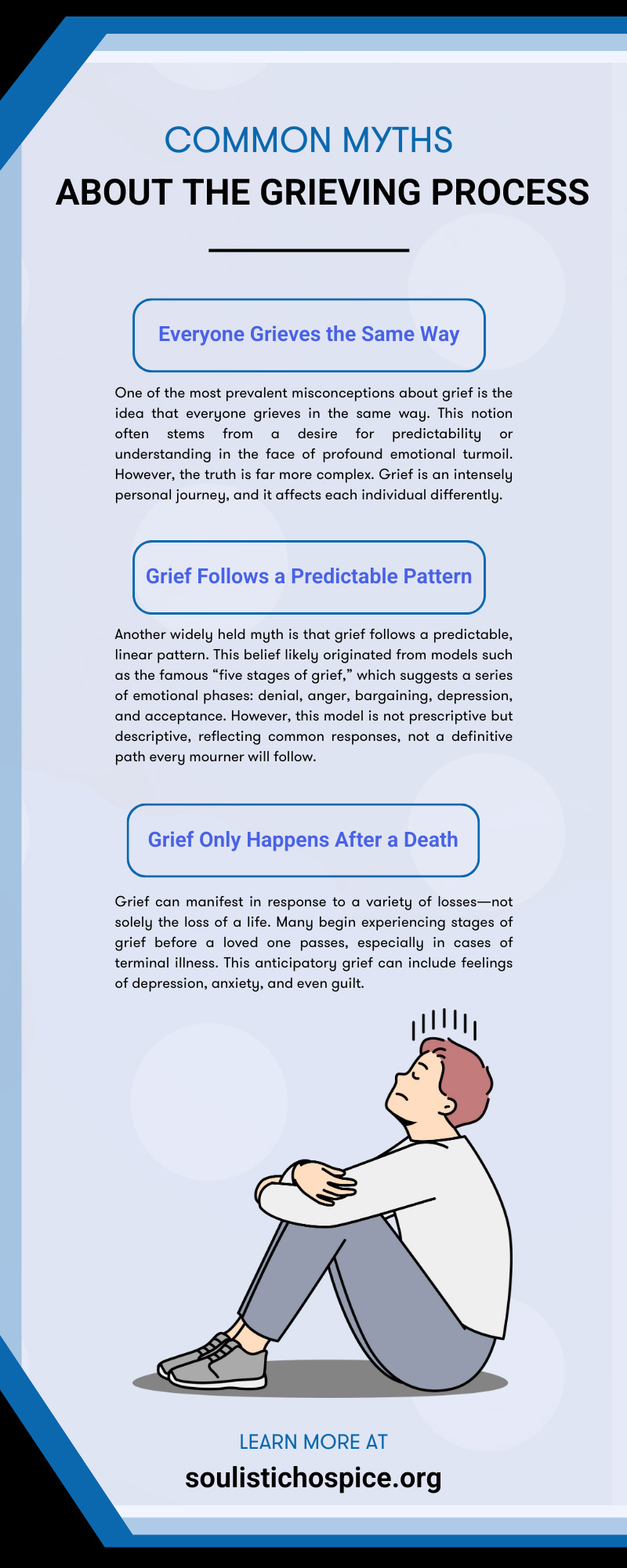
Grieving is a deeply personal and often misunderstood process, surrounded by a myriad of misconceptions that can impede our understanding and empathy for those who are mourning. We hope that through understanding these ten common myths about the grieving process, readers can develop a more compassionate approach toward their grief or support others who are navigating loss.
Everyone Grieves the Same Way
One of the most prevalent misconceptions about grief is the idea that everyone grieves in the same way. This notion often stems from a desire for predictability or understanding in the face of profound emotional turmoil. However, the truth is far more complex. Grief is an intensely personal journey, and it affects each individual differently. Factors such as personal coping mechanisms, the nature of the loss, one’s relationship with the deceased, and cultural or societal expectations can all influence how a person grieves.
Grief Follows a Predictable Pattern
Another widely held myth is that grief follows a predictable, linear pattern. This belief likely originated from models such as the famous “five stages of grief,” which suggests a series of emotional phases: denial, anger, bargaining, depression, and acceptance. However, this model is not prescriptive but descriptive, reflecting common responses, not a definitive path every mourner will follow. Grieving is not a linear process that one goes through in a set order. Instead, it’s a fluid experience where someone might cycle through different stages, possibly even experiencing multiple at once and in varied sequence.
Grief Only Happens After a Death
Grief can manifest in response to a variety of losses—not solely the loss of a life. Many begin experiencing stages of grief before a loved one passes, especially in cases of terminal illness. This anticipatory grief can include feelings of depression, anxiety, and even guilt. But it’s not just death that can initiate the grieving process. Grief can also follow the loss of a relationship, loss of health, loss of a job, or any other significant, traumatic life event. It’s crucial to understand that grief is a reaction to loss in its many forms, and this loss does not necessarily have to be tied to death.
Grief Never Goes Away
Another pervasive myth about grief is the belief that it never goes away—that grief is a lifetime commitment to sorrow. While grief is indeed a profound, often life-altering experience, it’s important to understand that it is not a permanent state. Over time, through processes of coping and healing, the intensity of grief typically diminishes. This diminishing is not to say that the loss will be forgotten or that the person grieving will cease to miss the deceased; rather, that the raw pain of grief evolves into a softer sorrow, integrated into one’s life journey. Most people will slowly find themselves returning to normal routines, experiencing happiness, and feeling like themselves again.
Grieving Means You Always Feel Sad
Grief is a complex and multifaceted emotional response, and while sadness is often a significant component, it is not the sole emotion that a person experiences during grief. In reality, grief can bring about a myriad of feelings, ranging from anger and confusion to guilt and even relief, all of which are natural reactions to loss. These emotions might alternate, overlap, or occur simultaneously, forming a unique emotional landscape for each individual. It is important to remember that it’s completely normal to not feel sad all the time when grieving. Emotions might fluctuate and even be contradictory at times.
It’s Better To Rush Grief
The unpleasant and overwhelming nature of grief often fuels the misconception that it’s better to rush grief, urging individuals to accelerate through their feelings in an attempt to regain a sense of normality. However, rushing grief is unfeasible and detrimental to the healing process. Grieving is an essential component of healing, a process that needs its own time; societal norms or expectations cannot pace it. Attempting to speed up this process can lead to suppressed emotions, unresolved grief, and potential mental health issues down the line. Individuals must give themselves the freedom, compassion, and time to grieve at their own pace.
No One Understands How You Feel
One common myth that often clouds the grieving process is the belief that no one else can understand the depth of your pain. This feeling of isolation can be overwhelming, creating a sense of solitary suffering. However, it’s important to understand that while your grief is indeed unique—shaped by your relationship to the loss—you are not alone in the experience of grief. Countless others have navigated the turbulent waters of loss and mourning, validating the myriad of emotions and experiences that come with it. There’s a vast network of support available, including grief counseling, grief support groups, and online communities, where individuals share their experiences, provide comfort, and offer understanding.
You Can Avoid the Grieving Process
There’s a misconception that we can sidestep the emotional turmoil associated with loss, and move forward without confronting our grief. However, attempting to ignore or avoid grief can lead to suppressed, undealt-with emotions that may resurface later in more harmful ways. It’s crucial to face your grief, allowing yourself to experience and express your emotions openly. Grief isn’t a process one should bypass but an essential element of the healing journey. Avoidance tactics can often lead to complicated grief, where the intensity of grief remains unchanged or even escalates over time, often resulting in prolonged emotional distress.
Time Heals All Wounds
One far-reaching myth about grief is the belief that time alone will heal all wounds. This adage suggests that merely waiting for the passage of time will ultimately mend the pain of loss. However, the healing process does not wholly depend on time nor does it occur in a vacuum. Healing from grief requires active engagement with the feelings and emotions associated with loss. Simply waiting for time to pass can often lead to suppressed emotions and unresolved grief, prolonging the healing process. What truly aids in healing is how you choose to spend that time—processing grief, seeking and accepting support, and creating a support system around you.
The Goal of Grief Is To “Get Over It”
The notion that the goal of grief is to “get over it” is a common myth that simplifies the profound, multifaceted process of grief into a single action of forgetting or moving on. This misconception does a disservice to those who are grieving as it implies that their loss is something that can be overcome or forgotten. However, grief is not a hurdle to cross, it’s a journey toward healing and acceptance. It’s natural and normal to never fully “get over” the loss of a loved one—the memory of them and the emotions associated with their loss may remain. The true goal of grief isn’t to forget or move past the loss but to find a way of living that includes the loss. It’s about finding a new normal where you can honor the memories of loved ones and keep them alive, allowing for continued personal growth and life experiences.
Now that we’ve debunked these ten common myths about grieving a loss, you have a better understanding of the grieving process. Contact Soulistic Hospice today if you’re looking for grief counseling in Tucson. We hope this knowledge empowers you to navigate your grief journey or support someone else in theirs with greater compassion and sensitivity.









